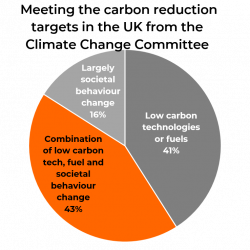
Common objections when communicating climate action and how to overcome them
by Livvy Drake
I asked my peers on Linkedin what common rebukes they hear around climate action and thought I would share some of the psychology that could be behind these comments:
1. ‘Oh but it’s Christmas/it’s tradition!’ (about meat vs vegan dishes, Christmas wrapping paper, etc.) “but we can’t change, it’s tradition”
This is status quo bias
People would prefer to do the same thing as it feels safe and uncertainty of the unknown is scary (and there is only 1 Christmas day a year!)
How to approach this:
How can you remove the uncertainty and fear for them? How can they try something different without it risking the overall experience? Suggest trying things out alongside tradition so it is not ALL or nothing/tradition or radically different.
2. “Lots of people tell me how technology will solve climate change; but they can’t specify what, how or when, and those who stick to nature just want to offset by planting trees. No one wants to reduce consumption though”
| This is an element of optimism bias It ‘refers to our tendency to overestimate our chances of positive experiences and underestimate our chances of negative experiences’. How to approach this: Try communicating about people like them who are changing their behaviours and reducing their consumption. Also consider using authority bias from an organisation like the Climate Change Committee who have recommended that change needs to come from both low carbon technology and individual change. |


3a. “There’s nothing we can do until the Government legislate, and then we’ll follow the rules. Until then, we carry on.”
3b. “What’s the point of recycling, it all gets sent to landfill or [insert country of choice] anyway.”
3c. “What little effort I do or habit I change won’t actually matter or make a difference, so why bother?”
3d. “When China and India take action then I will’ – said about recycling, climate action…..
This is an example of the ‘Free Rider’ problem, where the perception is that those not taking action benefit from others action.
DEFRA’s (2008) research on pro-environmental behaviour motivators, highlighted the above comments perfectly, they found that for pro-environmental behaviours people needed to know:
- Why they are being asked to act
- What difference their actions will make
- That they are ‘part’ of something
- That other people are taking action, so collectively their actions will have an impact
- That the new behaviours fit within their current lifestyle
- and/ or are expected by society
So communicating how their actions will make a difference locally, to their health, community and wellbeing, to demonstrate to Governments that people want change.
And finding examples of people like them or the countries, industries they are disillusioned with taking action could be effective.
4. “I recycle”. Full stop. No movement to take on any other behaviour changes such as reducing excess consumption at Christmas or even rethinking present wrapping materials.
This is a perfect example of ‘ceiling bias’
Which recycling has been shown to be an example of, again and again. Recycling is the ceiling behaviour which excuses other behaviours e.g. driving, overconsumption. This is particularly because recycling means you also don’t need to change the consuming behaviours or lifestyle changes just chuck in a different bin.
How to address this:
The foot-in-the-door technique suggests that you ask people to take another smaller action on the way to a bigger action e.g. going plant-based or cycling one day a week.
Recycling as a ceiling behaviour suggests that these people are not motivated by environmental rational so talk about other actions other benefits e.g. people adopting active travel or eating less meat because of health benefits.


With all these comments and situations, the most important thing to remember is that what ever your reasons, values and motivations for taking climate action and changing your behaviour, these will not win over other people who see the world different to you. But this doesn’t mean that they won’t take action all together.
The number of people going vegan or reducing meat for health reasons is for me a perfect example of how we can achieve the same result of less meat consumption, just through a different set of motivations and drivers.

Reach more people with your messages
Interested in more behaviour change inspiration? Sign up to my Sustainable Sidekicks newsletter

You might also like:


